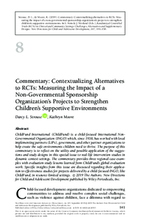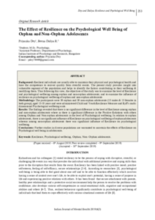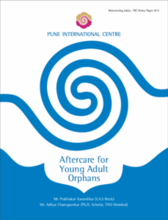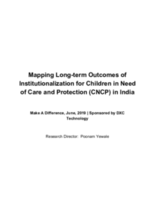childrens_living_arrangement
children_living_without_bio
Displaying 161 - 170 of 391
The aim of this review is to analyse the existing published studies regarding these caregivers’ relationships, with a focus on programs in South Asia.
The purpose of this commentary is to reflect on the utility and possible application of the suggestions and study designs in this special issue to real‐life intervention studies in dynamic context settings.
The objective of the study was to examine the level of Resilience and psychological wellbeing among orphan and non-orphan adolescents; and to examine the influence of resilience on psychological wellbeing of orphan and non-orphan adolescents.
This report on Aftercare is based on research on “Current Aftercare Practices” (CAP), with regard to Children in Need of Care and Protection (CNCP), under the Juvenile Justice (JJ) Act, 2015, conducted in five states of India: Delhi, Gujarat, Karnataka, Rajasthan and Maharashtra. It is about the status of Aftercare youth, or Care Leavers (CLs) transitioning from state care to adulthood in the wider community.
"Days after the managing trustee of an orphanage was arrested for sexually exploiting four minor inmates, activists have demanded Child Welfare Committee, District Child Protection Unit and police personnel to conduct frequent inspections at the homes in the district," says this article from the New Indian Express.
The government of the state of Kerala in India has launched a new program to promote kinship care for children currently residing in child care instititions, according to this article from the Times of India.
This paper attempts to recommend a suitable policy framework of aftercare services for Young Adult Orphans (YAOs) in India, with special reference to the state of Maharashtra.
The goal of this research was to challenge or validate the assumptions that underpin existing impact and change focused solutions; to combat the complete dearth of data and lack of meaningful information available in the sector about the longer term effects of institutional care on children in India; and to enable programmes both within and outside of Make A Difference to be designed on the back of benchmarked and trackable outcomes.
“Current Aftercare Practices” (CAP) is a documentation exercise designed to look at the support and services received by CLs from the objective lens of an ‘Aftercare Quality Index’(AQI), calculated using the scores within 8 domains. This report covers a total of 98 young adults from Rajasthan, comprising of 40 males and 58 females CLs, from both Government and NGO-run Child Care Institutions (CCIs) and 17 youth who, as children, availed the benefits under the Palanhar scheme of the Rajasthan Government.
A descriptive study was undertaken to assess self-esteem and its associated factors among adolescents living in orphanage and with parents at home in a selected orphanage and community, West Bengal with the objectives to assess level of self-esteem among adolescents living in orphanage and in home and to find out the associated factors related to self-esteem.







